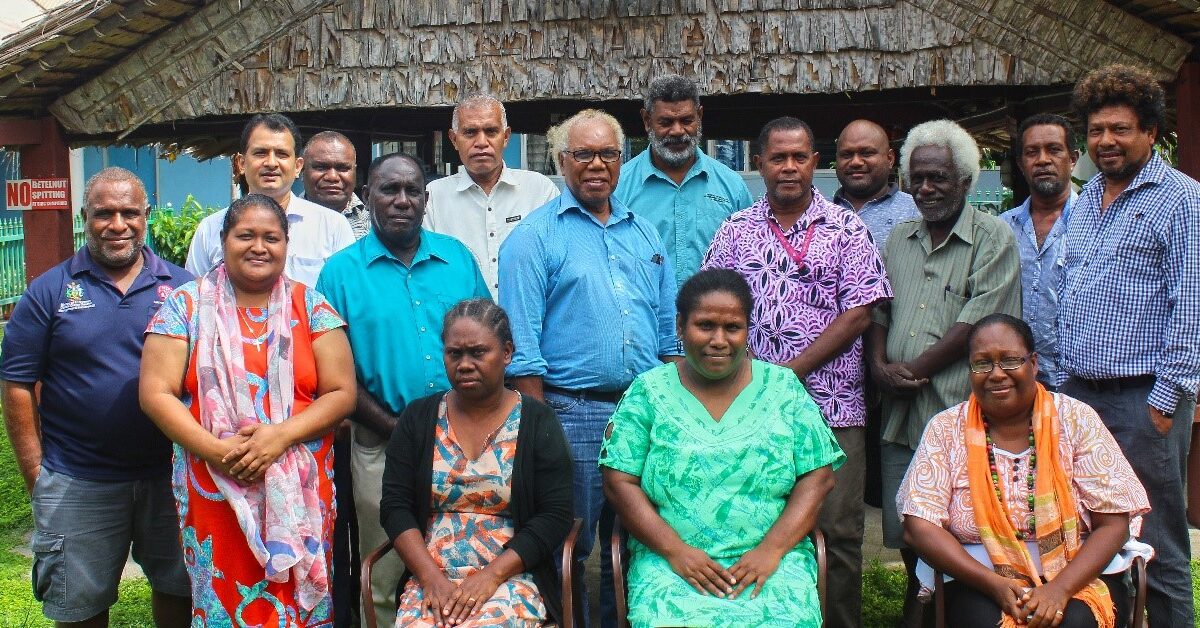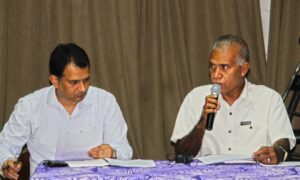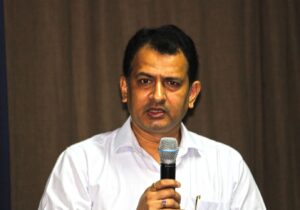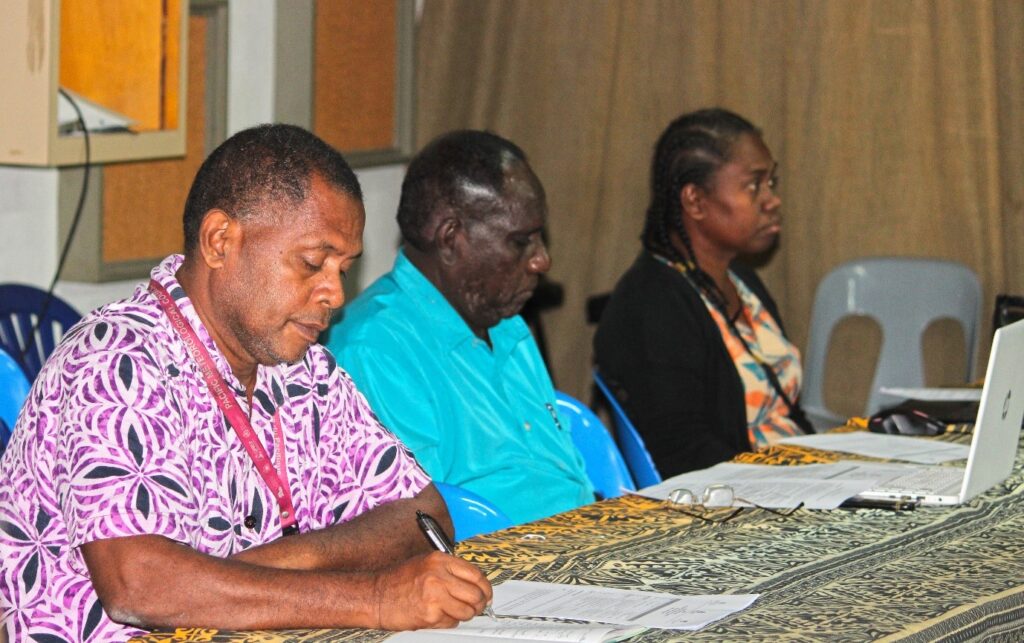

The Integrated Land Management (ILM) committee members during their inaugural meeting on 29th April. Other member reps were not able to make it to the first meeting due to other official commitment.
MAL establishes Integrated Land Management Committee (ILMC)
The Ministry of Agriculture and Livestock through the Integrated Forest Management Project (IFMP) of which the Food and Agriculture Organisation (FAO) of the United Nations is the implementing agency has successfully established its Integrated Land Management Committee (ILMC).
The committee (ILMC) core responsibility is to provide general oversight of project execution related to sustainable land management and improved decision making in production landscapes.
The project goal is to strengthen and complement ongoing efforts by the Government of the Solomon Islands and its partners in order to promote new approaches to sustainable forest management that is socially viable, economically feasible, and environmentally sound.

Permanent Secretary Supervising of MAL, Michael Ho’ota chairing the inaugural ILMC meeting. On his left, Technical Advisor, FAO Mr. Raushan Kumar.
Technical Advisor, FAO Mr. Raushan Kumar said the project has the aim of implementing integrated management of protected and productive forest landscapes for sustainable community development and multiple environmental benefits.
“One of the objectives of this project is mainly concerned with Integrated Land Management (ILM), and thus the committee (ILMC) was established as part of fulfilment of this objective and where the role would be to provide support as well as carry out monitoring of activities within this focal area,” Mr. Raushan said.
The committee (ILMC) held its inaugural meeting on 29th April 2021 at the SIBC conference room in Honiara and was chaired by MAL Permanent Secretary Supervising, Michael Ho’ota, Technical Advisor, FAO Mr. Raushan Kumar, and Assistant FAO Country Representative Mr. Jimi Saelea, who spoke about the projects and programmes implemented by FAO of the United Nations. Mr. Douglas Yee, National Programme Coordinator of the IFMP facilitated the meeting. The meeting was attended by wide range of stakeholders involved in sustainable land use and its management.
Assistant FAO country representative, Jimi Saelea said Integrated Land Management (ILM) is the second component of the Integrated Forest Management Project (IFMP) currently implemented in Solomon Islands and is funded by Global Environment Facility (GEF) and implemented by FAO under the country’s program framework (CPF-2018-2022).
“This component (ILM) practically deals with agriculture and forestry. The establishment of this committee (ILMC) is a requirement under the IFM project. The committee will eventually function within the Ministry of Agriculture and Livestock (MAL) as a technical working group under the Agriculture Oversight Committee of the Agriculture Sector Growth and Investment Plan (ASGIP) 2021-2030 which I understand will be launched later this year,” Mr. Saelea explained.
He added that unsustainable use of land for agriculture and to some extent forestry has been blamed for land degradation and soil infertility and he said these are issues that needs serious attention now to avoid future disasters. “To address these issues both government and non-government actors must collaborate.”
While acknowledging MAL Permanent Secretary, Ethel Frances and Permanent Secretary Supervising/Deputy Secretary Technical (DST) Michael Ho’ota for the formation of the committee (ILMC) Mr. Saelea said the establishment of the committee is critical to ensure stakeholders are kept informed and the projects implementation are guided and kept on track.

Technical Advisor, FAO Mr. Raushan Kumar raised a point during the ILMC inaugural meeting
Meanwhile, Permanent Secretary Supervising of MAL, Michael Ho’ota said Agriculture is an important sector for the Solomon Islands’ national economy as it sustains 85 percent of the rural population with food crops, cash crops, and livestock for their daily livelihoods, food, and social security.
“Agriculture holdings account for 40 percent of the landmass of the country. About 35 percent of GDP is generated by subsistence agriculture, and nationwide, 92 percent of the population is engaged in agriculture in some way. We are currently experiencing regularly occurring variabilities in climate change impacts and effects such as heavy rainfalls, hot and dry spells, extremely high and low temperatures, coastal sea level rise, coastal salinity and infiltration, these effects threaten food security and agriculture, infrastructure, and other resources that provide for the wellbeing of men, women, and children of Solomon Islands.
“The manner in which we use Land must now be seriously addressed in light of the increasing environment and land resources exploitation. The fast increasing population demands more food and incomes that in turn put more pressure on the land and other resources. In the rush to satisfy these needs most people are unaware that they are contributing to negative results like soil degradation, low soil fertility, low crops productivity, and the current increasing health issues such as malnutrition and lack of economic wellbeing resulting in poverty,” Mr. Ho’ota emphasized.
He further stressed that these activities result in more problems like uncontrolled subsistence practices, water catchment deforestation and reduction, nutrients leaching and depletion, use of agro-chemicals detrimental to the environment, clear felling of forest lands, open mining activities, just to mention some of the leading adverse activities that come about with no consideration to proper land use planning.
“With all the issues said and the demand from both the national government and our rural populace I am pleased to note that under the Component 2: Integrated Land Management: reviews and revision of outdated and ineffective policy, regulatory and legal frameworks governing land use in the country will be done. Further more thorough assessment of impacts of current land-use practices on biodiversity, land degradation and ecosystem services will also be conducted and this will feed into the review and revision; providing the policy makers with reliable information to base their policies and strategies on and most importantly the establishment of a multi-sectoral coordination mechanism to ensure the sectoral frameworks are streamlined and complementary rather than contradictory,” Mr. Ho’ota highlighted.

Director Planning of MAL Peter Rarahabura and two reps from Live & Learn agency.
Mr. Ho’ota thanked the newly appointed committee (ILMC) members for accepting their appointments and he reiterated that the Integrated Land Management Committee (ILMC) will be the main advisory body for the implementation of integrated land management component 2 of the IFM Project.
ILMC members are representations of the Ministry of Agriculture and Livestock, Ministry of Forestry and Research, Ministry of Environment, Climate Change, Disaster Management and Meteorological Services, Ministry of Lands, Housing and Survey and the Solomon Islands National University (SINU) through the Faculty of Agriculture, Forestry and Fisheries, Kastom Garden Association (KGA) and Live & Learn agency.
ENDS///